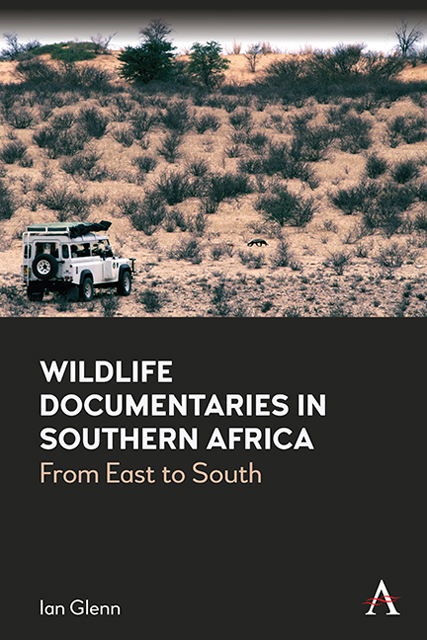Book contents
- Frontmatter
- Dedication
- Contents
- List of Figures
- Acknowledgements
- Introduction
- Chapter 1 What do the Critics Say?
- Chapter 2 A Theoretical Coalition?
- Chapter 3 Gone South: From East to Southern Africa
- Chapter 4 Private Lodges, Infrastructures and Guides
- Chapter 5 Going South: The Results
- Chapter 6 The Early History
- Chapter 7 The South Africans Enter the Game
- Chapter 8 Michael Rosenberg and Partridge Films
- Chapter 9 David and Carol Hughes
- Chapter 10 The Bartletts in the Namib, the Liversedges in Botswana
- Chapter 11 John Varty, Elmon Mhlongo and Londolozi
- Chapter 12 Richard Goss and Kim Wolhuter
- Chapter 13 Dereck and Beverly Joubert
- Chapter 14 Other Major Contributors
- Chapter 15 Going Live: Africam And Wildearth
- Chapter 16 Craig and Damon Foster
- Chapter 17 Must Love Animals?
- Chapter 18 The Social Turn
- Chapter 19 The Future of the Genre
- Chapter 20 The Influence of the Genre
- Conclusion
- Filmography
- Plates
- References
- Index
Chapter 17 - Must Love Animals?
Published online by Cambridge University Press: 10 January 2023
- Frontmatter
- Dedication
- Contents
- List of Figures
- Acknowledgements
- Introduction
- Chapter 1 What do the Critics Say?
- Chapter 2 A Theoretical Coalition?
- Chapter 3 Gone South: From East to Southern Africa
- Chapter 4 Private Lodges, Infrastructures and Guides
- Chapter 5 Going South: The Results
- Chapter 6 The Early History
- Chapter 7 The South Africans Enter the Game
- Chapter 8 Michael Rosenberg and Partridge Films
- Chapter 9 David and Carol Hughes
- Chapter 10 The Bartletts in the Namib, the Liversedges in Botswana
- Chapter 11 John Varty, Elmon Mhlongo and Londolozi
- Chapter 12 Richard Goss and Kim Wolhuter
- Chapter 13 Dereck and Beverly Joubert
- Chapter 14 Other Major Contributors
- Chapter 15 Going Live: Africam And Wildearth
- Chapter 16 Craig and Damon Foster
- Chapter 17 Must Love Animals?
- Chapter 18 The Social Turn
- Chapter 19 The Future of the Genre
- Chapter 20 The Influence of the Genre
- Conclusion
- Filmography
- Plates
- References
- Index
Summary
Introduction
Animals and their relations to humans, whether of differences or similarities, have become a major topic in biology (Bekoff and Pierce 2009; Bekoff 2010; De Waal and de Waal 1996; De Waal and Tyack 2009; De Waal 2016; Safina 2015; Safina 2020) but also in film studies, ethics and philosophy (Brunel 2018; Burt 2002; Derrida 2008; Haraway 2013; Kirksey and Helmreich 2010; Lorimer 2015). Intriguing as they are, most of these discussions draw their conclusions from domestic animals or wild animals in captivity and so have a limited value and validity in understanding and critiquing wildlife films. A brief discussion of anthropomorphism, speciesism and the affective turn will lead to what seem to me more fruitful topics for the films in this study: adoption, re-wilding and touch.
Anthropomorphism
As several earlier comments in this study have shown, the critique of wildlife films or sections of them as anthropomorphic is often based on superficial pejorative analysis – as in Bousé’s critique of Kearton’s penguins or Chris’s comments on Jamie Uys’s warthogs. Given the ways in which recent studies have complicated earlier notions of species differences, what would be the correction of anthropomorphism if not a denial of our links to other mammals or our ability to make sense of their behaviour from our viewpoint as fellow creatures? (Daston and Mitman 2005; Serpell 2003).
One area where wildlife films surely had a very different effect from what most American critics have argued is about accusations of anthropomorphizing and particularly anthropomorphizing about gender roles. Whenever I try to analyse this, I think of the embarrassing episode of my African Jacana interpretation. At Lake Panic near Skukuza in the Kruger National Park, there are usually African Jacanas and often they are nesting. I took photos of a nest with the beautiful eggs and the male in attendance but when I came back a day or two later, the water level seemed to have risen and the nest and eggs were gone. I looked indignantly at the resident hippos but was comforted by the sight of a Jacana male and female mating vigorously. They are not letting those hippos win, I thought.
- Type
- Chapter
- Information
- Wildlife Documentaries in Southern AfricaFrom East to South, pp. 213 - 222Publisher: Anthem PressPrint publication year: 2022

